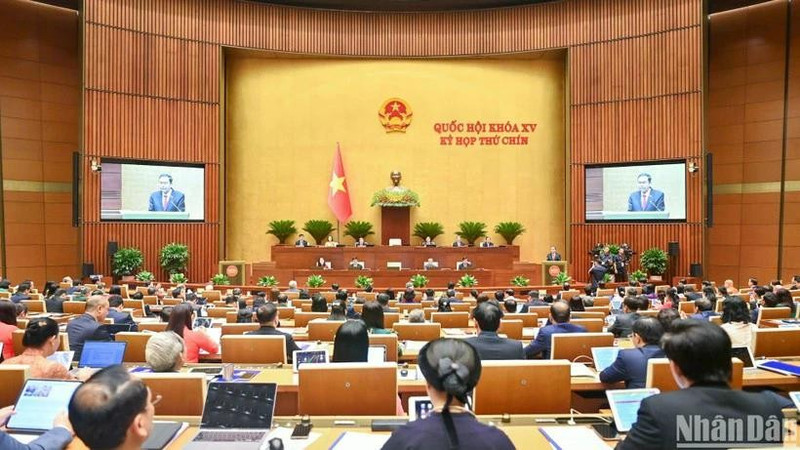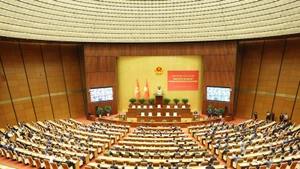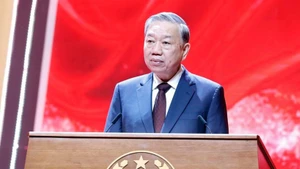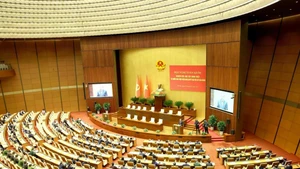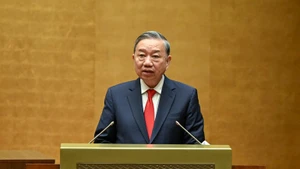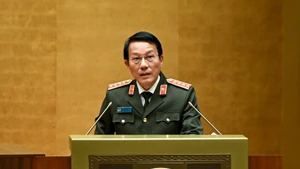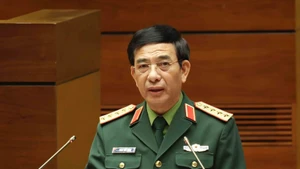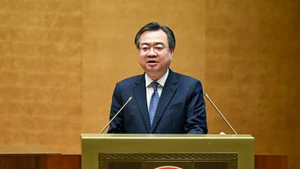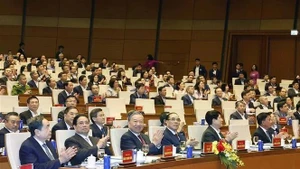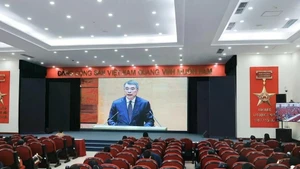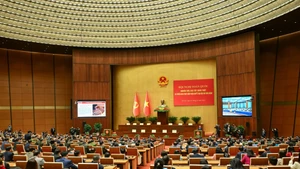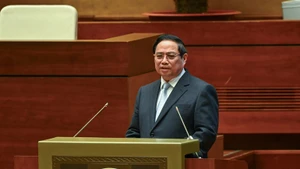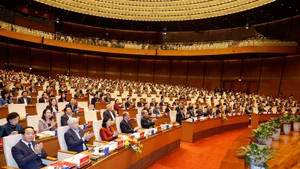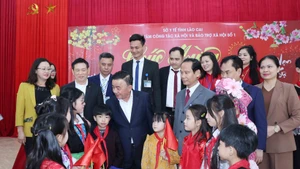During this time, the NA Standing Committee and other relevant bodies continue to work intensively and urgently on a range of pressing and significant matters, aiming to institutionalise the Party’s major policies and meet the people’s expectations.
Laying the foundation for State machinery reform
A key highlight of the session was the adoption of the resolution on amending and supplementing several articles of the 2013 Constitution. This is a strategic task, both politically and legally, designed to concretise the Party’s Resolution No. 18-NQ/TW on streamlining the organisational structure and enhancing the efficiency and effectiveness of the state apparatus. Of the constitution’s 120 articles, numerous revisions have been proposed — not only to provide a legal basis for merging provincial administrative units but also to promote decentralisation and empower local government bodies.

NA Deputy Nguyen Tao (Lam Dong Province) emphasised that the amendment of the 2013 Constitution is expected to shape a streamlined state apparatus that is even closer to the people, more grounded in reality, and aligned with the demands of a new era.
The NA has established a drafting committee for the constitutional amendment, following a reformed process and broad participation from citizens, agencies, and organisations. Public consultations were launched during the session through the VNeID application.

Advancing digital transformation in the judiciary
During group discussions on the draft law amending and supplementing several provisions of the Law on the Organisation of the People's Courts and other laws, State President Luong Cuong underscored that legislative reforms must align with the Party’s directives on a streamlined and effective government structure. The goal is to reduce the administrative system to two levels and merge remaining 34 provinces and cities. In this reform journey, judicial reform aims to bring the system “closer to the people, for the people, and in defence of the people” while addressing longstanding practical obstacles.
The 9th session also saw the enhancement of regulations on electronic evidence within the revised drafts of the Civil Procedure Code and the Law on Administrative Procedures, among others. The legal recognition of electronic mail, messages, audio and video recordings, and digital data as valid evidence marks a significant step forward. It modernises litigation procedures and facilitates faster, more accessible access to justice for citizens.

The draft law also outlines specific principles for the collection, assessment, and authentication of electronic evidence, while emphasising the importance of legality, integrity, and privacy protection. Notably, the proposed mechanism for submitting evidence via the court's electronic portal received high praise from NA deputies, as it would reduce costs and time, particularly benefiting people in remote and disadvantaged areas.
Toward two-tier local government model and private sector development
One of the historic resolutions passed during the 9th session was on the merger of provincial-level administrative units, moving toward a two-tier local government structure consisting only of provinces/cities and communes/wards — eliminating the district level. This move concretises the Party's policy on streamlining the state apparatus, fostering sustainable development, optimising resources, and improving governance efficiency.
Deputy Nguyen Thi Suu (Hue City) noted: “The thoughtful preparation and sense of responsibility of the NA are clearly demonstrated.”
The 9th session also marked a milestone with the adoption of a resolution on special policy mechanisms to promote private sector development, giving concrete form to the Politburo’s Resolution No. 68-NQ/TW.
The NA thoroughly discussed several key draft laws related to science, technology, and innovation, including the Law on Science, Technology and Innovation; the revised Law on Product and Goods Quality; and the amended Law on Atomic Energy.
These laws all embrace the values of "openness, pioneering, and creativity." As Vice Chairwoman of the NA, Nguyen Thi Thanh remarked, “When it comes to breakthroughs in science and technology, the law itself must also be groundbreaking.”
In the context of a global race in digital technology, artificial intelligence, and new energy, economic experts emphasise that boldly integrating innovation into the legal framework is how Viet Nam can avoid being left behind. Specifically, the commitment to allocate at least 3% of the state budget to science and technology, if seriously implemented, will serve as a vital “seed fund” to stimulate the national innovation ecosystem.
Effective oversight and listening to the People

The spirit of democracy and responsibility was clearly demonstrated throughout the session. The NA reviewed the report of the Central Committee of the Viet Nam Fatherland Front summarising public opinions and petitions. It also held discussions on the oversight results of citizen feedback resolution from the previous 8th session.
In preparation for the upcoming second phase of the session, NA Chairman Tran Thanh Man urged delegates to continue listening to the thoughts and aspirations of voters in order to refine decisions that are practical and widely supported. This spirit not only strengthens public trust but also reinforces the NA’s role as the true representative of the people’s will and aspirations.
With a nearly 40-day duration, an unprecedented workload, and a host of transformative decisions, the 9th session is expected to exceed all expectations, delivering key “breakthroughs” in institutional, legal, economic, and social frameworks.
It also vividly reflects a consistent “declaration of reform” and the NA’s resolute spirit of innovation, affirming its central role in establishing the legal foundation for a new era of development and empowering Viet Nam to assert itself confidently on the global stage.
